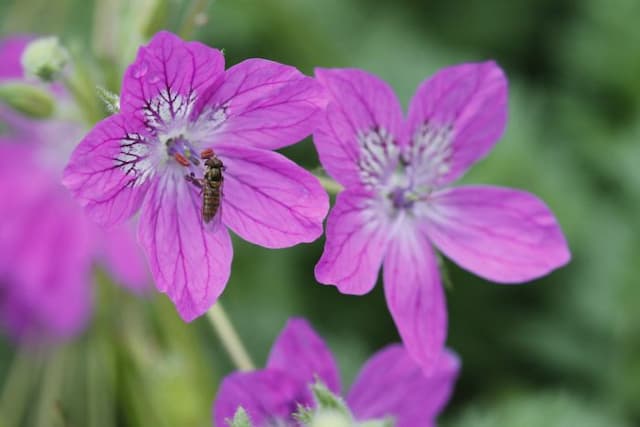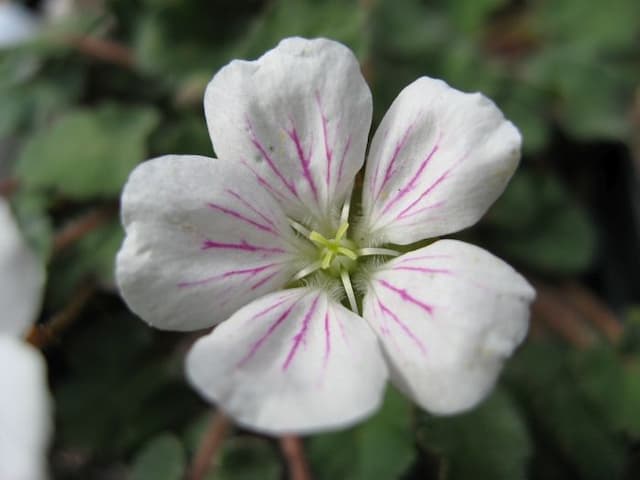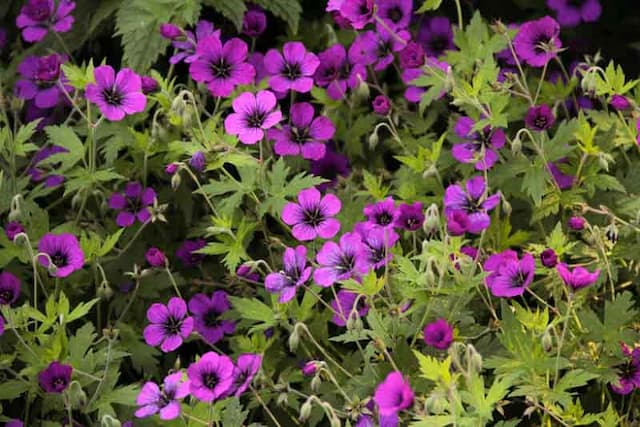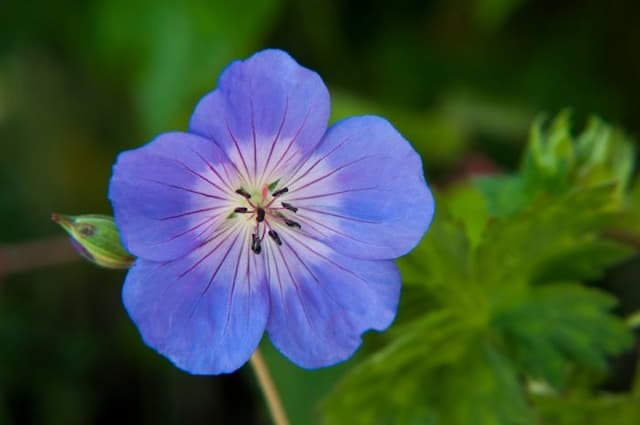Geranium Pelargonium 'Pulsar Deep Rose' (Pulsar Series) (Z)

ABOUT
The plant Pelargonium 'Pulsar Deep Rose', commonly known as a type of Geranium, is a visually striking specimen characterized by its vibrant floral display and lush foliage. The flowers are the most eye-catching feature, presenting in a deep rose color that can add a pop of rich, romantic hue to any garden setting. These blossoms have a rounded shape, typically comprising five petals, and often show off interesting patterns or markings in a slightly darker shade, giving them a unique and captivating appearance. Surrounding the flowers, the foliage forms a dense and bushy backdrop. The leaves are green with a rounded outline, often showing off a variable pattern of darker green zones or zones with a hint of red or burgundy, especially around the edges which may also have a scalloped or softly serrated finish. This intricate design on the leaves complements the striking deep rose flowers, making the plant a highly decorative addition that can simultaneously offer a lush green texture alongside its blooms. Overall, the combination of the dramatic deep rose flowers and the ornamental leaves create a plant that is not only visually attractive but also versatile for decorative purposes in a variety of garden settings or as part of a container display indoors or outside.
About this plant
 Names
NamesFamily
Geraniaceae
Synonyms
Geranium, Zonal Geranium
Common names
Pelargonium 'Pulsar Deep Rose'
 Toxicity
ToxicityTo humans
Geraniums, such as Pelargonium 'Pulsar Deep Rose', are not considered highly toxic to humans. However, ingestion can potentially cause minor symptoms such as nausea, vomiting, or diarrhea. It is usually recommended to avoid eating any part of the geranium plant.
To pets
Geraniums, including Pelargonium 'Pulsar Deep Rose', can be toxic to pets, particularly cats and dogs. If ingested, they may cause symptoms such as vomiting, anorexia, depression, and dermatitis. In some cases, ingestion can lead to more severe reactions. It's best to prevent pets from having access to geraniums.
 Characteristics
CharacteristicsLife cycle
Annuals
Foliage type
Evergreen
Color of leaves
Green
Flower color
Deep Rose
Height
1 foot (30 cm)
Spread
1 foot (30 cm)
Plant type
Herb
Hardiness zones
9
Native area
Southern Africa
Benefits
 General Benefits
General Benefits- Easy to Grow - Pelargoniums are often easy to care for and can thrive with basic gardening skills.
- Colorful Blooms - The 'Pulsar Deep Rose' variety provides vibrant, deep rose-colored flowers that can enhance the visual appeal of any garden space.
- Long Blooming Period - This plant often has a long flowering season, providing color and interest for an extended period.
- Drought Tolerance - Pelargoniums are known for being drought-tolerant, reducing the need for frequent watering and making them suitable for dry climates.
- Heat Resistance - Able to withstand high temperatures, making them ideal for hot summer gardens.
- Pest Resistance - Pelargoniums are generally resistant to many common garden pests, thereby reducing the need for chemical pest control measures.
- Attracts Pollinators - They can attract bees and butterflies, which are beneficial for pollination in the garden.
- Versatile Planting Options - Suitable for planting in beds, borders, and containers, offering flexibility for different garden designs and spaces.
- Multipurpose Usage - Can be used for ornamental purposes, as well as in culinary settings, like garnishing or flavoring certain dishes (non-medical).
- Scented Foliage - Some pelargoniums, including those in the Pulsar Series, may have scented leaves that can add a fragrant dimension to gardens and outdoor areas.
 Medical Properties
Medical PropertiesThis plant is not used for medical purposes.
 Air-purifying Qualities
Air-purifying QualitiesThis plant is not specifically known for air purifying qualities.
 Other Uses
Other Uses- Geranium leaf scented sachets: Dried leaves of Pelargonium 'Pular Deep Rose' can be used to create natural sachets that impart a pleasant fragrance in drawers and closets.
- Natural dye: The petals can be used to produce a natural dye for fabrics or paper, creating a range of pink and rose hues.
- Aromatherapy: The essential oil extracted from the leaves can be used in aromatherapy for its soothing and mood-enhancing properties.
- Flavoring for desserts: The subtly rose-scented leaves can be used to flavor sugar or as an ingredient in desserts such as jellies and puddings.
- Crafts and potpourri: Dried petals and leaves can be incorporated into potpourri mixes or used in various crafts for decoration and fragrance.
- Edible garnish: The flowers are edible and can be used as a pretty garnish for salads and desserts.
- Photography subject: With its deep rose blooms, the plant is an excellent subject for botanical photography.
- Botanical art: The unique form and color of the plant's flowers and leaves make it an ideal specimen for botanical illustrations and watercolor paintings.
- Garden design: Pelargoniums can also be used in concept gardens to represent themes such as 'romance' due to their rose-like flowers.
- Fragrance for homemade candles: The essential oil or dried leaves can be used to infuse homemade candles with a floral scent.
Interesting Facts
 Feng Shui
Feng ShuiGeraniums are often used in Feng Shui to bring positive energy while also promoting health and happiness. Place a Geranium in the Health (east) or Family (southeast) area of a home to foster nurturing chi and to symbolize a vibrant life.
 Zodiac Sign Compitability
Zodiac Sign CompitabilityThe Geranium is not used in astrology practice.
 Plant Symbolism
Plant Symbolism- Positive Thoughts: The deep rose color of the Geranium is often associated with positivity and uplifting energy, symbolizing good spirits and a sunny outlook.
- True Friendship: Geraniums are traditionally given as gifts to signify true friendship, representing trust, respect, and the enjoyment of each other's company.
- Comfort: The plant's soothing fragrance and beautiful blooms can symbolize comfort and solace, often used to convey a sense of being there for someone in times of need.
- Stability and Grounding: The Geranium's hardy nature and the ability to thrive in various conditions can represent personal stability and emotional grounding.
- Preference for the Natural World: With its beautiful flowers and pleasant scent, the Geranium may symbolize a love and preference for nature and the simple pleasures it provides.
 Water
WaterGeraniums like the Pulsar Deep Rose need regular watering to maintain moist but not saturated soil. Water once the top inch of soil feels dry, typically every 7 to 10 days, depending on climate conditions. Water directly at the base of the plant to avoid wetting the foliage, as this can promote disease. Approximately 16 ounces of water per square foot of soil surface area is a good rule of thumb, though this may vary due to weather and the plant’s stage of growth. During the hot summer months, you might need to water more frequently, and less often in cooler, overcast conditions.
 Light
LightGeraniums, including the Pulsar Deep Rose, thrive in bright, indirect sunlight. The ideal location is one where they receive at least six hours of morning sunlight but are protected from the harsh afternoon sun. A spot near an east-facing window or a balcony that receives some dappled shade would work best to ensure vibrant growth without the risk of leaf burn.
 Temperature
TemperatureThe Pulsar Deep Rose geranium prefers temperatures between 55 and 75 degrees Fahrenheit. It can tolerate minimum temperatures down to around 30 degrees Fahrenheit for short periods, but frost can damage the plant. Maximum temperatures should not consistently exceed 80 degrees Fahrenheit, as excessive heat can cause stress.
 Pruning
PruningPrune Pulsar Deep Rose geraniums to encourage bushier growth and remove dead or fading blooms, which promotes further flowering. The best time to prune is in early spring or after a flowering cycle has completed. Cut back up to a third of the plant, focusing on leggy stems and spent flower heads. Regular pruning, every 6 to 8 weeks during the active growing season, keeps the plant compact and healthy.
 Cleaning
CleaningAs needed
 Soil
SoilThe ideal soil mix for a Geranium (Pelargonium 'Pulsar Deep Rose') should be well-draining and fertile, composed of equal parts peat, perlite, and potting soil. Aim for a soil pH between 6.0 and 7.0 for optimal growth.
 Repotting
RepottingGeraniums should generally be repotted every one to two years. It's best to repot Pelargonium 'Pulsar Deep Rose' in the spring before the onset of the growing season.
 Humidity & Misting
Humidity & MistingGeraniums prefer moderate humidity levels, but as Pelargonium 'Pulsar Deep Rose', it can tolerate dry indoor air. Aim to maintain humidity levels around 40-50%.
 Suitable locations
Suitable locationsIndoor
Place in bright, indirect light and water when top soil is dry.
Outdoor
Needs full sun to partial shade; well-draining soil; avoid waterlogged areas.
Hardiness zone
10-11 USDA
 Life cycle
Life cyclePelargonium 'Pulsar Deep Rose' germination begins when its seeds are planted in well-draining soil and exposed to warm temperatures and adequate moisture. The seedlings emerge with their first true leaves, and as young plants, they require plenty of sunlight and water to establish a strong root system. During the vegetative growth stage, the plants develop a robust foliage network and begin branching, best encouraged with regular fertilization and occasional pruning. This geranium then enters the flowering stage, producing vibrant deep rose blooms that can last throughout the summer and into early fall in the right conditions. As temperatures cool, the plant may enter a period of dormancy, during which growth slows down significantly or stops, and it may require protection in colder climates to survive until the next growing season. Following dormancy or overwintering, the geranium can resume active growth, potentially producing seeds and beginning the cycle anew if conditions allow.
 Propogation
PropogationPropogation time
Spring-Summer
Propogation: The Pelargonium 'Pulsar Deep Rose', commonly known as geranium, is commonly propagated through stem cuttings. The most suitable time for this is late spring to early summer when the plant is actively growing. To propagate geraniums, a healthy stem around 4 to 6 inches (10 to 15 centimeters) long is cut just below a node. Leaves from the lower half of the cutting are removed, and the cut end may be dipped in rooting hormone to encourage root development. The cutting is then planted in a pot filled with a well-draining potting mix. It's essential to keep the soil moist but not overly wet and to place the pot in a warm spot with indirect light until the cutting has rooted, which typically takes a few weeks. After rooting, the new geranium plant can be transplanted to a larger pot or into the garden.







![Cranesbill [Rothbury Gem]](/_next/image?url=https%3A%2F%2Fplants-admin.emdemapps.com%2Fimages%2Fplants%2F%2Fimages%2F604b6243984c2.png&w=640&q=75)

